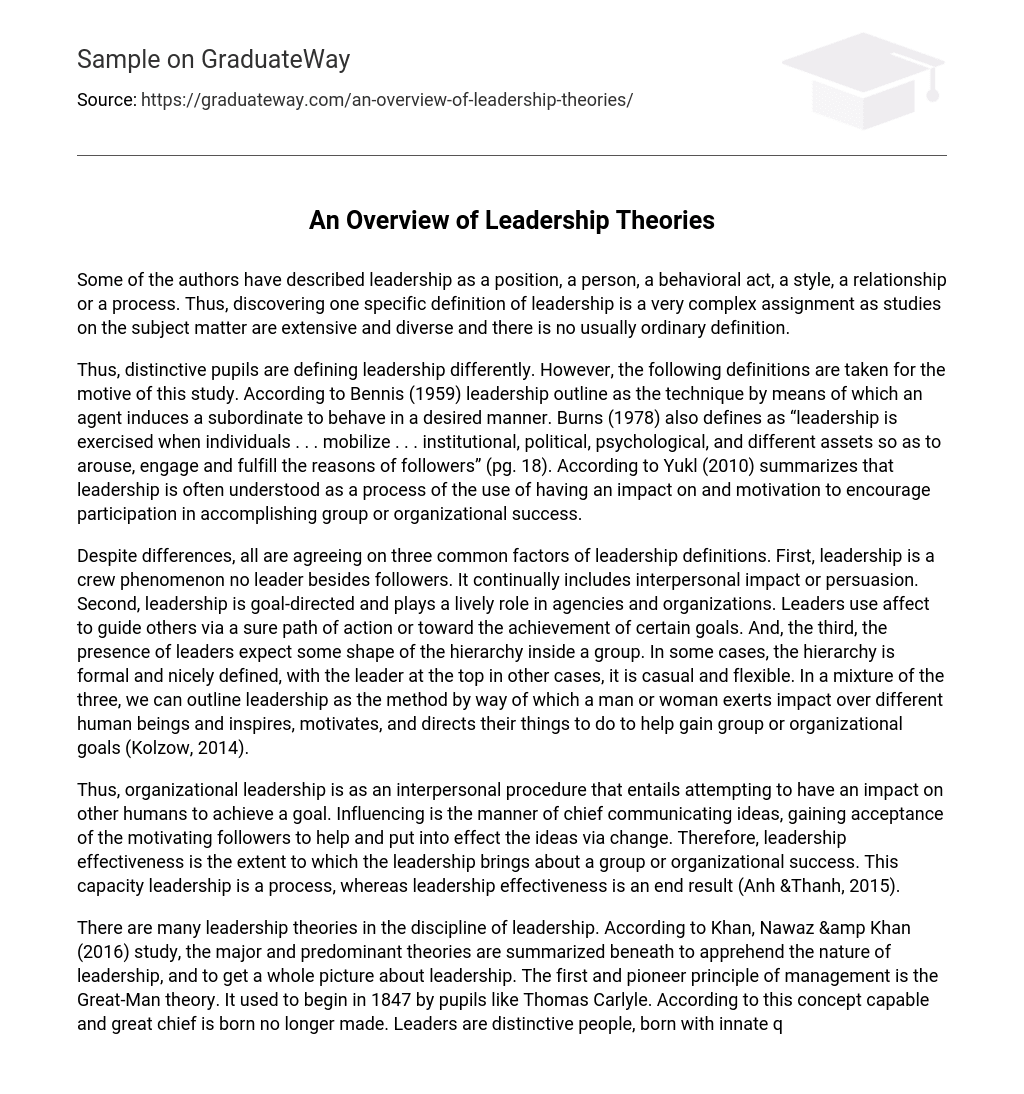Some of the authors have described leadership as a position, a person, a behavioral act, a style, a relationship or a process. Thus, discovering one specific definition of leadership is a very complex assignment as studies on the subject matter are extensive and diverse and there is no usually ordinary definition.
Thus, distinctive pupils are defining leadership differently. However, the following definitions are taken for the motive of this study. According to Bennis (1959) leadership outline as the technique by means of which an agent induces a subordinate to behave in a desired manner.
Burns (1978) also defines as “leadership is exercised when individuals, mobilize, institutional, political, psychological, and different assets so as to arouse, engage and fulfill the reasons of followers” (pg. 18). According to Yukl (2010) summarizes that leadership is often understood as a process of the use of having an impact on and motivation to encourage participation in accomplishing group or organizational success.
Despite differences, all are agreeing on three common factors of leadership definitions. First, leadership is a crew phenomenon no leader besides followers. It continually includes interpersonal impact or persuasion. Second, leadership is goal-directed and plays a lively role in agencies and organizations. Leaders use affect to guide others via a sure path of action or toward the achievement of certain goals. And, the third, the presence of leaders expect some shape of the hierarchy inside a group.
In some cases, the hierarchy is formal and nicely defined, with the leader at the top in other cases, it is casual and flexible. In a mixture of the three, we can outline leadership as the method by way of which a man or woman exerts impact over different human beings and inspires, motivates, and directs their things to do to help gain group or organizational goals (Kolzow, 2014).
Thus, organizational leadership is as an interpersonal procedure that entails attempting to have an impact on other humans to achieve a goal. Influencing is the manner of chief communicating ideas, gaining acceptance of the motivating followers to help and put into effect the ideas via change. Therefore, leadership effectiveness is the extent to which the leadership brings about a group or organizational success. This capacity leadership is a process, whereas leadership effectiveness is an end result (Anh &Thanh, 2015).
There are many leadership theories in the discipline of leadership. According to Khan, Nawaz & Khan (2016) study, the major and predominant theories are summarized beneath to apprehend the nature of leadership, and to get a whole picture about leadership. The first and pioneer principle of management is the Great-Man theory.
It used to begin in 1847 by pupils like Thomas Carlyle. According to this concept capable and great chief is born no longer made. Leaders are distinctive people, born with innate qualities and destined to lead. Those leaders have many followers at the time of crisis. In this regard, Napoleon and Hitler are the cases in point.
The 2nd leadership concept is a trait theory. It is also one of the primitive leadership theories. It was a dominant theory in the 1920s. As to the view of this principle, super leaders are born with certain bodily traits and personality traits which distinguish them from non-leaders. These attributes are tireless, energy, incisive intuition, uncanny foresight, and irresistible persuasive powers.
Another leadership theory is a behaviorist. This idea used to be in the early 1950s after a number of researchers started to discourage primitive theories of great-man and trait theories. Behaviorist believes extremely good leaders are made, now not born through coaching and observation. It classifies leaders based on their action into two widespread subcategories- humans centered and venture focused. Action-oriented leadership is an improvement of leadership fashion theory, focusing on the task team and individually. People targeted emphasize interpersonal micro skills of effective leadership conduct (Gill, 2011).
With an endless effort of scholars in looking out higher leadership styles, contingency (situational) leadership concept is emerging. As to the view of this theory, there is no one quality style of leadership. Successful and enduring leaders will use different patterns in accordance with the nature of the situation and the followers (Kolzow, 2014).
With fast trade and growth of globalization, pupils have been perpetuating strongly in searching for an extra comprehensive and dependable theory of leadership. Hence, by using a combining trait, behavioral, and contingency methods of leadership, one of the new integrative theory of transformational and transactional leadership used to be developed in 1978 by Burns.
In 1991 Bass and Avolio had been reshaping Burn’s work with the new version of transformation leadership what be called full-range leadership concept (FRLT). FRLT denotes three typologies of leadership behavior: transformational, transactional, and laissez-faire leadership, which are represented by using nine awesome factors. And, the Multifactor Leadership Questionnaire (MLQ) is used as a survey instrument to investigate the 9 factors in the FRLT. This concept is extensively used through pupils these days as a modern day to make a find out about leadership (Antonakis, Avolio & Sivasubramaniam, 2003).
However, all theoretical tactics are essential in the body of understanding of leadership. The full-range management idea (FRLT) denotes three typologies of management behavior: transformational, transactional, and laissez-faire leadership use to study the effect of leadership styles on leadership effectiveness in the case of BCA.





